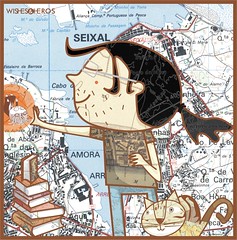Now That's What I Call New Pop!
Mais uma lista do pitchfork!
New pop, the UK moment post-post-punk, is too porous to be rigidly defined. It contains everything from ABC's Arcadian soul-disco, to Orange Juice's Byrds/Buzzcocks jangle, to the Human League's supersonic Abba update. Much of it could also be called post-punk or synth-pop or leftover glam. There was no shared manifesto; many of the bands couldn't be more different.
If anything defined it, it was a strange mix of DIY (spurred by punk) and ambition-- to make the charts, make TV appearances, make newspaper headlines. Sometimes this was for money; sometimes just to see if it could be done; sometimes simply to reach as many people as possible. But clearly, for many bands, merely selling a few 7"s was no longer an option.
If new pop had an architect, it was Paul Morley. A writer for the weekly New Musical Express at a time when the UK music press mattered more than ever, Morley championed post-punk over Oi!, a conservative, proto-hardcore version of punk. But by late 1980-- with his beloved Joy Division no more, post-punk having reached an insurmountable peak with PiL's Metal Box, and more three-chord punk chancers than ever-- Morley was getting exhausted. In the NME's 1980 year-end issue, he recoiled from the cassette-trader feebleness post-punk had arrived at with a call to "bring life back to the radio, to make the single count" and a push towards "overground brightness."
It seemed Morley wasn't alone. In spring 1981, the NME, along with Rough Trade Records, issued C81, a cassette compilation celebrating the last three years of musical adventure. It also seemed like a capstone. Pere Ubu, the Raincoats-- these bands would have never, for better or worse, been let near the "Top of the Pops" studio. The new bands wanted nothing but. Except this wasn't just a lunge at the brass ring. If punk meant anyone could be in a band, then that band could be a pop band, right? And if you had interesting ideas, why not shoot for the widest possible audience?
It was also the era when the term "rockist" entered into the public lexicon. Though now being flogged within an inch of its usefulness in an alt-weekly near you, you can't really discuss new pop without it. Bands espoused the "healthiness" of pop, rather than the squat conditions of post-punk. They reacted not only against 60s rock baggage, but a revitalized rock industry in the face of punk. There was all this stuff around-- dub, Kraftwerk, disco-- just begging to be used. The tormented specter of Chuck Berry became even more demonized.
This makes new pop sound utopian, and it was. But like most utopias, it went unrealized for a reason. "Entryism" was up there with "ambition" and "desire" as the era's big buzzwords. This wasn't alt-rock with its imagery of bands being thrust into the spotlight in spite of themselves, of one-hit wonders affecting an image of indie purity. These bands wanted to make it, and they weren't shy about it. And it's a very small step from entryism to conspicuous consumption, from Scritti Politti to the Thompson Twins, from Glenn Gregory to Gordon Gecko.
That may be off-putting to some, but new pop essentially sowed the seeds of its own demise. All this activity took place in a moment where punk had sent the industry spiraling. It knew it had something-- something it could sell-- but wasn't quite sure how. So a whole bunch of activity was allowed to slip through to the pop charts unmolested. But capitalism, which so many of these bands embraced on a scale from conflicted to wholehearted, is more powerful than any band. It didn't take long for the industry to right itself, and for bands who played the game with no art school poses to surpass those who did.
In 1984 came New Pop's ultimate prank, as well as its ultimate undoing. Frankie Goes To Hollywood-- an apocalyptic queer disco army masterminded by Morley and producer Trevor Horn-- was a huge hit on both sides of the Atlantic. Their shtick-- videos that begged for censure, sleeves that crossed gay porn with hardcore philosophy, infamous interviews-- was pure Morley, pure post-punk. But their singles were brazenly sexual, a chromium Panzer division, new pop crossed with punk priapism. When the album stiffed, however, the public increasingly felt insulted by the pomo antics of Horn and Morley's ZTT label. Howard Jones seemed like a safer bet.
New pop is likely never to repeat itself. MTV changed the dissemination of popular music-- ironically boosting the music's profile in the U.S. initially. The corporatization of pop only grew worse in the following decades. As the pop/indie divide grew, it became much easier for bands with interesting ideas to keep them to themselves rather than try to slip them past corporate paymasters. When "indie" exploded back into the mainstream in the 90s, Britpop almost seemed like a reaction against a "pop of ideas"; it retained the go-for-broke ambition but with a Beatles/Stones comfort that assured it would indeed make it big.
It was also set against the other music making pop interesting at the time, at least by the music press: rave, rap, and r&b. And that, perhaps, is the biggest reason why new pop will never repeat itself. Pop music in the early 1980s was still segregated in a way that may be impossible for someone born after 1990 to ever fully understand. Throughout the 1980s, many commercial soul and r&b stations refused to play hip-hop during daytime hours. In 2005, with r&b ruling the charts and the hardest-core rap getting into the top 10, the industry probably doesn't see the need for white interpretations of black music, art school or not.
New pop was all about the present, the impermanence of the charts, living directly in the here-and-now of week-to-week. Which makes a tribute to it feel even more museum-like than usual. But despite all the rhetoric about cheap confections and destroying the canon, great music remains great music two decades later, whatever the creator's intentions. So this Top 40 (what else could it be?) is a celebration of a four-year window where rock felt like it could absorb anything, where non-stars became supernovas (if only for a minute), where "experimentation" went down with a gulp of sugar, where all the old babies were out with the bathwater. They are often, if not always, the band's biggest hit. If that seems obvious, well, obviousness was kind of the point.
New pop, the UK moment post-post-punk, is too porous to be rigidly defined. It contains everything from ABC's Arcadian soul-disco, to Orange Juice's Byrds/Buzzcocks jangle, to the Human League's supersonic Abba update. Much of it could also be called post-punk or synth-pop or leftover glam. There was no shared manifesto; many of the bands couldn't be more different.
If anything defined it, it was a strange mix of DIY (spurred by punk) and ambition-- to make the charts, make TV appearances, make newspaper headlines. Sometimes this was for money; sometimes just to see if it could be done; sometimes simply to reach as many people as possible. But clearly, for many bands, merely selling a few 7"s was no longer an option.
If new pop had an architect, it was Paul Morley. A writer for the weekly New Musical Express at a time when the UK music press mattered more than ever, Morley championed post-punk over Oi!, a conservative, proto-hardcore version of punk. But by late 1980-- with his beloved Joy Division no more, post-punk having reached an insurmountable peak with PiL's Metal Box, and more three-chord punk chancers than ever-- Morley was getting exhausted. In the NME's 1980 year-end issue, he recoiled from the cassette-trader feebleness post-punk had arrived at with a call to "bring life back to the radio, to make the single count" and a push towards "overground brightness."
It seemed Morley wasn't alone. In spring 1981, the NME, along with Rough Trade Records, issued C81, a cassette compilation celebrating the last three years of musical adventure. It also seemed like a capstone. Pere Ubu, the Raincoats-- these bands would have never, for better or worse, been let near the "Top of the Pops" studio. The new bands wanted nothing but. Except this wasn't just a lunge at the brass ring. If punk meant anyone could be in a band, then that band could be a pop band, right? And if you had interesting ideas, why not shoot for the widest possible audience?
It was also the era when the term "rockist" entered into the public lexicon. Though now being flogged within an inch of its usefulness in an alt-weekly near you, you can't really discuss new pop without it. Bands espoused the "healthiness" of pop, rather than the squat conditions of post-punk. They reacted not only against 60s rock baggage, but a revitalized rock industry in the face of punk. There was all this stuff around-- dub, Kraftwerk, disco-- just begging to be used. The tormented specter of Chuck Berry became even more demonized.
This makes new pop sound utopian, and it was. But like most utopias, it went unrealized for a reason. "Entryism" was up there with "ambition" and "desire" as the era's big buzzwords. This wasn't alt-rock with its imagery of bands being thrust into the spotlight in spite of themselves, of one-hit wonders affecting an image of indie purity. These bands wanted to make it, and they weren't shy about it. And it's a very small step from entryism to conspicuous consumption, from Scritti Politti to the Thompson Twins, from Glenn Gregory to Gordon Gecko.
That may be off-putting to some, but new pop essentially sowed the seeds of its own demise. All this activity took place in a moment where punk had sent the industry spiraling. It knew it had something-- something it could sell-- but wasn't quite sure how. So a whole bunch of activity was allowed to slip through to the pop charts unmolested. But capitalism, which so many of these bands embraced on a scale from conflicted to wholehearted, is more powerful than any band. It didn't take long for the industry to right itself, and for bands who played the game with no art school poses to surpass those who did.
In 1984 came New Pop's ultimate prank, as well as its ultimate undoing. Frankie Goes To Hollywood-- an apocalyptic queer disco army masterminded by Morley and producer Trevor Horn-- was a huge hit on both sides of the Atlantic. Their shtick-- videos that begged for censure, sleeves that crossed gay porn with hardcore philosophy, infamous interviews-- was pure Morley, pure post-punk. But their singles were brazenly sexual, a chromium Panzer division, new pop crossed with punk priapism. When the album stiffed, however, the public increasingly felt insulted by the pomo antics of Horn and Morley's ZTT label. Howard Jones seemed like a safer bet.
New pop is likely never to repeat itself. MTV changed the dissemination of popular music-- ironically boosting the music's profile in the U.S. initially. The corporatization of pop only grew worse in the following decades. As the pop/indie divide grew, it became much easier for bands with interesting ideas to keep them to themselves rather than try to slip them past corporate paymasters. When "indie" exploded back into the mainstream in the 90s, Britpop almost seemed like a reaction against a "pop of ideas"; it retained the go-for-broke ambition but with a Beatles/Stones comfort that assured it would indeed make it big.
It was also set against the other music making pop interesting at the time, at least by the music press: rave, rap, and r&b. And that, perhaps, is the biggest reason why new pop will never repeat itself. Pop music in the early 1980s was still segregated in a way that may be impossible for someone born after 1990 to ever fully understand. Throughout the 1980s, many commercial soul and r&b stations refused to play hip-hop during daytime hours. In 2005, with r&b ruling the charts and the hardest-core rap getting into the top 10, the industry probably doesn't see the need for white interpretations of black music, art school or not.
New pop was all about the present, the impermanence of the charts, living directly in the here-and-now of week-to-week. Which makes a tribute to it feel even more museum-like than usual. But despite all the rhetoric about cheap confections and destroying the canon, great music remains great music two decades later, whatever the creator's intentions. So this Top 40 (what else could it be?) is a celebration of a four-year window where rock felt like it could absorb anything, where non-stars became supernovas (if only for a minute), where "experimentation" went down with a gulp of sugar, where all the old babies were out with the bathwater. They are often, if not always, the band's biggest hit. If that seems obvious, well, obviousness was kind of the point.




